

Annual report from Denmark’s Electronic Research Library 2008

Colophon
Title:
Annual report from Denmark’s Electronic Research Library 2008
Summary:
Annual report from Denmark’s Electronic Research Library 2008
Publisher:
Denmark’s Electronic Research Library / Danish Agency for Libraries and Media
Responsible institution:
Denmark’s Electronic Research Library / Danish Agency for Libraries and Media
Author:
Denmark’s Electronic Research Library / Danish Agency for Libraries and Media
Language:
English
URL:
http://www.bibliotekogmedier.dk/fileadmin/publikationer/publikationer_engelske/deff/annualreport_2008/index.htm
ISBN:
978-87-92057-66-2
Digital ISBN:
978-87-92057-67-9
Version/edition:
16-09-2009
Data formats:
html,htm,jpg,gif,pdf,css,js
Publisher category:
statslig
Translation:
Vibeke Cranfield
Contents
Preface
Cooperation
Activities
Licenses
Organisation in 2008
- DEFF coordination committee
- DEFF responsible
- DEFF steering committee
- Programme groups
- Architecture and Middleware
- Information Supply
- Meeting the User
- New Institutions
Programme group: Architecture & Middleware
Programme group: Information Supply
Programme group: Meeting the User
Programme group: New Institutions
License group for Education Librarians (LUB)
License group for Universities and Research Libraries (LUF)
Knowledge Exchange
International cooperation
Accounts
Projects
Objectives 2009
Theme: DEFF review 2008 – the library as strategic partner
- Development within research and education
- Development within library and information technology
- Professional recommendations
- Organisational challenges
Preface
2008 was the last year of the DEFF steering committee’s two-year mandatory period, and the committee can look back on two productive years. A large number of projects and activities have been launched, cooperation between the participating parties has been extended and part of the foundation for a new steering committee’s strategic work has been laid.
Projects and activities
Together with a number of strategy documents an unaltered vision and mission for DEFF have provided the strategic framework for DEFF’s projects. Within this framework DEFF’s programme groups have formulated action plans which were approved by the steering committee, and the programme groups have subsequently secured project applications for projects that match the objectives of the action plans.
Over the period the following examples of important projects and activities should be noted:
- Two pilot projects concerning data wells for the use of i.a. advanced integrated search systems
- Online service with delivery of electronic images of book front covers to be used during search
- Streamlining of cataloguing and search activities through further cooperation about DanBib
- Integration of Danish libraries in OCLC’s WorldCat
- Extension of the research registration system PURE
- Open Access work i.a. through the international partnership Knowledge Exchange
- General consolidation including financial support in selected cases
- Support of information literacy through the development of the UB test
- Participation in international development of Open Source storage system Fedora.
Basis for the future work
The steering committee has in 2008 prepared the ground for DEFF’s further work by conducting an international review of DEFF, initiating an analysis of future library service to researchers and a cost-benefit analysis of alternative publishing models. Danish Universities’ memo on university libraries in Denmark from November 2008 will likewise form part of the future work in DEFF.
In conclusion it can be said that DEFF has enjoyed a remarkably satisfactory progress, and the new steering committee has therefore been provided with a solid foundation for the continued development of DEFF.
Bo Öhrström
Cooperation
DEFF seeks to support cooperation in all relevant cases, being convinced that cooperation is the only way to overcome an increasing complexity and growing financial pressure. It is encouraging to see that this focus maintains and develops the collaboration between the ministries, institutions and the international partners within the DEFF area. Good examples of this are the following initiatives:
- The Danish Federation for access management WAYF
- Videnskab.dk with management support during establishment phase
- Bibliometric research indicator, including i.a. architecture reuse from The Danish Research Database
- License initiatives with over 250 contracts and the participation of more than 200 institutions
- Continuation of the international Knowledge Exchange partnership after evaluation of the first three years of cooperation
Activities
Activities in the secretariat have in 2008 been marked by the intense activity and level of ambition in the programme groups, organisation development in the secretariat and the DEFF review. Moreover, the secretariat has had to prepare for the inclusion of the upper secondary schools (gymnasium), social and health colleges (SOSU) and Centres for Adult Education (VUC) in DEFF. These entered the DEFF cooperation as per 1. January 2009. They represent almost 200 institutions, and it has been all-important to gear DEFF’s organisation to the handling of the new participants. The secretariat has also worked on preparations for the accession of the new steering committee, the mandate of the former steering committee expiring on 31. December 2008.
As for the secretariat itself, work has been going on with the new guidelines for applications and the interplay with the programme groups.
Apart from the day-to-day running of the office, the secretariat has continued to work with various professional development tasks. One rather resource-demanding project has been the work on the establishment of a data well. In connection with the clarification projects in the programme group Information Supply, the secretariat participated in the preparation of the final report, and was still involved in the follow-up phase at the turn of the year.
The secretariat has also dealt with a number of assignments in connection with work on the bibliometric research indicator.
The library sector has been involved in work on a technical infrastructure for research registration which will support appropriation of grants to universities on the basis of research activity (the so-called quality-distributed basis subsidies).
The international collaboration in Knowledge Exchange (KE) has changed organisational structure during 2008. On the basis of an evaluation of the collaboration, the parties agreed on forming a smaller steering committee with added decision-making competency and with only one management representative from each of the three cooperation organisations JISC (Joint Information Systems Committee) in Great Britain, SURFfoundation in Holland and DFG (Deutsche Forschungsgemeinschaft) in Germany.
In future the strategic management will thus be pla- from The Danish Research Database. ced in the steering committee combined with an annual Strategic Forum, with participation of the The secretariat has entered into an agreement with partners’ top management. The Strategic firm Forum the consultancy The Lime Guild about preparing held in November was a great success, and every- an analysis of future library service to researchers. one agreed to continue working with the main themes The final report is expected to be ready some time from 2008 as well as intensifying the dialogue with during autumn 2009. the EU Commission. The final contract about a continued KE cooperation has been signed by the four partners and is valid three years from the 1. Septem-ber 2008 until 1. September 2011.
A DEFF review was held in September 2008, where key persons from the international milieu were invited, together with the steering committee and the chairmen of the programme groups, to discuss DEFF’s strategy, vision, action plans and general activities. The result was two productive days which provided food for thought.
DEFF-responsible Bo Öhrström continues as member of the steering committee for videnskab.dk as the representative for the Ministry of Culture. The portal, the objective of which is i.a. to attract more attention to the research institutions and make these more exciting for children and young people, was launched with great success at the beginning of 2008. Bo Öhrström also chairs the WAYF steering committee. Finally Bo Öhrström is the chairman of Technical Committee and continues to be heavily involved in the implementation of the bibliometric indicator for the Research and Innovation Agency. The bibliometric indicator is based on technology from The Danish Research Database.
The secretariat has entered into an agreement with the consultancy firm The Lime Guild about preparing an analysis of future library service to researchers. The final report is expected to be ready some time during autumn 2009.
Licenses
The educational field has been characterized by a large number of fusions over the past few years. When institutions fuse the license agreements, which each institution had before the fusion, must be gathered together in a new contract for the new institution. Apart from that there will often be a reorganisa-tion of the license work in the newly fused institution.
In the license area 2008 has therefore witnessed a focus on the consolidation of the tasks related to fusions and license agreements. Many adjustments have been made in terms of tackling the tasks in relation to the libraries as well as to the publishers.
The reorganisation of the license invoicing started on 1. January 2008, and invoicing now takes place twice a year: 1. April and 1. October. This has meant clearer information about license agreements and prices for the individual institutions. This solution is still being further developed in order as far as possible to comply with the wishes of the participating libraries.
In the license group for universities and research institutions (LUF) and the license group for educational libraries (LUB) there has been great activity. Four meetings were held during the year for both groups. Simultaneously several working groups have been appointed who on the basis of Action Plan 2007-2009 examine the development and solution of tasks in relation to license agreements. LUF has established a working group looking into new price models for licenses. Another working group has via a questionnaire charted the use of Danish licenses in the libraries. A third working group planned a theme day about e-books for primo 2009. LUB has collected material for an ideas catalogue for marketing which will be published on www.deff.dk.
The research libraries’ purchases of electronic resources through DEFF 2001-2008
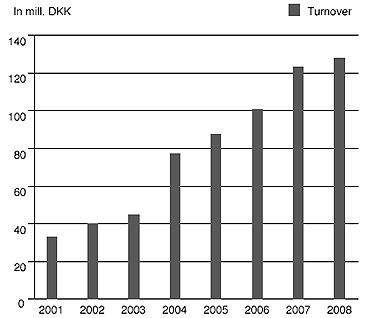
The figure shows the development in the turnover in license cooperation from 2001-2008. As it appears the turnover has been steadily increasing and has now passed an annual figure of DKK 128 mil. This increase is expected to continue at the same rate.
Development of number of licenses and institutions

The drop in the graph of institutions is due to fusions taking place in universities and university colleges.
Organisation in 2008
DEFF coordination committee
- Steen Kyed, Deputy Permanent Secretary, Ministry of Culture (KUM) (chairman)
- Katrine Tarp, Head of Division, Ministry of Culture (KUM)
- Hans Müller Pedersen, Deputy Director General, Danish Agency for Science, Technology and Innovation (VTU)
- Peter Uffe Meier, Specialist Consultant, Danish Agency for Science, Technology and Innovation (VTU)
- Lars Mortensen, Director General, Ministry of Education (UVM)
- Mads Mikkelsen, Head of Section, Ministry of Education (UVM)
DEFF responsible

Deputy Director Bo Öhrström, Danish Agency for Libraries and Media
Diagram
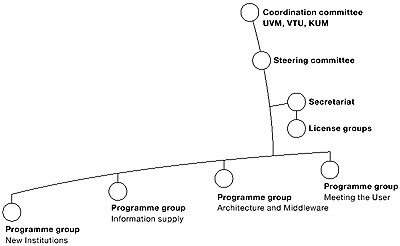
DEFF steering committee
- Kim Østrup, Vice President, IBM Danmark A/S (chairman)
- Gert Bechlund, University Director, Copenhagen Business School
- Poul Bjerregaard, Director, Aarhus Business College (retired medio 2008)
- Svend Larsen, Director General, State and University Library
- Erland Kolding Nielsen, Director General, The Royal Library
- Børge Obel, Dean, Aarhus School of Business (retired medio 2008)
- Peter Rubeck, Library Director, University College North Jutland
- Annette Winkel Schwarz, Development Director, DTV ViTiS, Technical University of Denmark
- Jens Thorhauge, Director General, Danish Agency for Libraries and Media
 |
 |
 |
 |
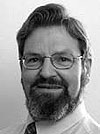 |
 |
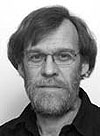 |
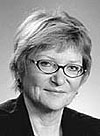 |
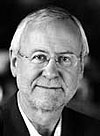 |
Programme groups
Architecture and Middleware
- Arne Sørensen, State and University Library (chairman)
- Ole Michaelsen, Technical Library of Copenhagen
- Kasper Løvschall, Aalborg University Library
- Ingelise Stæhr, University Library of Southern Denmark
- Anders Christensen, The Royal Library, National Library and Copenhagen University Library
- Peder Lærke Nielsen, CBS Library
- Tonny Laursen, Roskilde University Library
- Christian Tønsberg, Techical Knowledge Center of Denmark
- Karina Steffen, State and University Library
- Bo Öhrström, Danish Agency for Libraries and Media
- Jakob Heide Petersen, Danish Agency for Libraries and Media
Information Supply
- Mogens Sandfær, Technical Knowledge Center of Denmark (chairman)
- Per Steen Hansen, Aalborg University Library
- Anna Mette Morthorst, ASB Library, Aarhus University
- Claus Vesterager Pedersen, Roskilde University Library
- Ingelise Stæhr, University Library of Southern Denmark
- Lars Nondal, CBS Library
- Alfred Heller, Technical Information Center of Denmark
- Karin Lodberg, VIA University College
- Ellen V. Knudsen, State and University Library
- Frede Mørch, KULife
- Lise Mikkelsen, DEFF secretariat
Meeting the User
- Tina Pipa, Copenhagen University Library – Faculty Library for Social Science, The Royal Library, Copenhagen University Library (chairwoman)
- Michael Poltorak Nielsen, State and University Library
- Thomas Hansen, Aalborg University Library
- Karen Harbo, ASB Library, Aarhus University
- Jørgen Madsen, The Royal Library, National Library and Copenhagen University Library
- René Steffensen, CBS Library
- Birgit Brink Lund, Tietgen Business School
- Anne Sandfær, DEFF secretariat
New Institutions
- Mai Aggerbeck, VIA University College Holstebro (chairwoman)
- Gitte Gjøde, Engineering College of Aarhus
- Thomas Kjær, University College North Jutland
- Lars Kofod-Jensen, Frederiksberg College of Education, University College Metropol
- Lis Faurholt, University College South
- Bente Thorup Andersen, University College North Jutland
- Niels Hasselgaard Jensenius, The Administrative Library
- Ellen Bolbro, CVU Jelling (retired medio 2008)
- Jakob Nedergaard Mortensen, DEFF secretariat
- Kirsten Due, DEFF secretariat
License groups
License Group for Universities and Research Institutions (LUF)
- Anna Mette Morthorst, ASB Library, Aarhus University (chairwoman)
- Anette Schneider, Technical Information Center of Denmark
- Barbara Melchior, KUBIS
- Birgit Brejnebøl, CBS Library
- Jette Fugl, Copenhagen University, Life
- Lene Stampe Mortensen, Roskilde University Library
- Lone Madsen, University Library of Southern Denmark
- Lone R. Katberg, Aalborg University Library
- Marianne Vadgaard Christensen, State and University Library
- Susanne Preusse, Technical Information Center of Denmark
- Anne Marie L. Danielsen, VIA University College Campus Horsens, Library
- Birgit Rabitz, Herlev Hospital, Medical Library
- Karsten Roos, The Royal Danish Academy of Fine Arts, School of Architecture Library
- Kirsten Bisgaard, Royal Danish Defence Academy, Management Center
- Sofie Bonde Wodschow, The Administrative Library
- Janne Vendt, DEFF secretariat
- Lotte Jørgensen, DEFF secretariat
License Group for Educational Libraries (LUB)
- Karin Lodberg, VIA University College (chairwoman)
- Lisbeth Andersen, Hasseris Gymnasium
- Merethe Bloch Stein, Espergærde Gymnasium & HF
- Helle Behrens Eriksen, Køge Business College
- Birgitta Vikstrøm, University College Metropol
- Peter Hald, Technical Library of Copenhagen
- Benedicte Kirkegaard (obs.) Gentofte Libraries
- Kristine Hinrichsen, University College North Jutland
- Connie Kjærgaard, Business College South Denmark, Library Odense
- Birgitte Sass (sub.) University College Sjælland
- Lone Hansen (sub.), University College North Jutland
- Annette Grube Lorentzen (sub.), IBC Kolding
- Helena Ekelund (sub.), Business Academy Copenhagen North
- Susanne Nielsen (sub.), Holstebro Technical College
- Lotte Sterup DEFF secretariat
- Kirsten Due, DEFF secretariat
- Dorte Thuesen, DEFF secretariat
Programme group: Architecture & Middleware
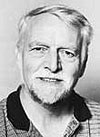
Chairman Arne Sørensen
The main tasks of the programme group is to build up an IT-architecture that will guarantee a coherent Danish IT-infrastructure for the libraries in general and the research libraries in particular, to ensure an architecture that will form part of a coherent Danish architecture for modern citizen and user services and efficient digital management as well as support the establishment of actual common components and common operating solutions for the libraries.
The area’s action plan is divided into five action lines:
- Simplification and consolidation in national communities
- Architecture and interfaces for ’Integrated Search’
- User and access management
- The library in digital Denmark
- Business processes
Many members of the programme group participated in the National IT and Telecom Agency’s architecture conference in April 2008.
Activities
In 2008 there have been seven active projects, three of which finished during that year:
DanBib as genuine union catalogue
The project has worked out a model which in the final analysis can mean a radical reorganisation of the workflow that is today spent on the cataloguing of physical materials. The basic idea is to support a dynamic process where entries in the union catalogue are at any time updated to an ideal quality level, and where the individual libraries can connect their local versions of the entry to the joint entry so that common updating is automatically spread everywhere in an automatic process. The purpose is thus both a quality enhancement and improved efficiency. The project has attracted a lot of stakeholders with about 50 participants involved in the central workshop. Despite the project concerning one of the traditional areas and querying previous virtues and quality norms, the project’s recommendation still turned out to be to carry on with an actual implementation project. The support for this will show whether the reorganisation will in fact succeed. The implementation project is to be completed in 2009.
Danish libraries in Worldcat
The project has two objectives: Firstly to improve the basis for reuse in cataloguing via access to Worldcat which is the world’s largest catalogue of physical library material, and secondly to exhibit Danish libraries’ material more systematically in Worldcat and thereby encourage international loans from Danish libraries. Thus the project is related to DanBib as genuine union catalogue, but as opposed to this the Worldcat project does not change the prevalent routines in the libraries. The backing for the project has therefore been completely unambiguous. Also this project will be subject to an implementation follow-up in 2009 where the experimental phase will be followed by actual full operation.
Preliminary study of business and agreement models for services
The purpose of the project was to examine the library sector’s need for common guidelines for business and agreement models in relation to offering and accepting various types of services. It was a question of a preliminary study via a qualitative interviewing round in various relevant libraries and gathering inspiration from other public and private organisations. The project concluded that the preparation of actual business cases (and models for these) was outside the programme group’s field of activity, and rather belongs in managements and general business development in libraries. The project’s recommendation is preparation of a DEFF standard contract that can be used across libraries when agreements have to be made with internal or external customers. So far no follow-up on the project has been planned.
Other initiatives
The programme group continues to have an important share in the national project on user and access management which is now organised in www.wayf.dk. It happens partly via major roles in the steering committee for this interministerial initiative, partly by supporting and exploiting projects like the present one: Connection of commercial library services to Wayf.
Altogether the programme group has launched initiatives which are significant for further collaboration and consolidation among the research libraries. In many cases, however, the sector is influenced by traditions and institutional egotism which makes it very hard indeed to succeed in establishing common solutions. During the period it has, however, been possible to observe other initiatives working in the direction of common systems and consolidation, like for example the recommendation in Danish Universities’ report on libraries and the initiative behind Statens IT, both of which initiatives emerged during 2008.
Read more at https://infoshare.dtv.dk/twiki/bin/view/ ArkitekturMiddleware/WebHome
Programme group: Information Supply

Chairman Mogens Sandfær
The programme area deals with the content of the digital libraries.
Firstly the information produced by the library’s own institution which local interest dictates should be handled in the most efficient way (collecting, organising, registering, preserving, mediating). This is a question of the knowledge capital of the institutions.
Secondly, the information produced somewhere else (typically abroad), but which is a necessary prerequisite for the institution’s research, learning, innovation and services to the authorities. Here it is a question of licenses and data wells and of getting as much as possible at the lowest possible cost.
It applies to both types that digitisation swiftly changes organisational conditions and models for handling and mediation of scientific information.
Thus Open Access, free information access for all readers whatever institutional affiliation, is a progressive concept that challenges the established fast-form-oriented setup, where publishers and libraries constitute the necessary bodies between author and reader. DEFF generally and the programme area in particular actively support this development and the libraries’ readjustment to new and exciting roles in digital information mediation.
Activities
The programme group has held six one-day meetings and supported the completion of a large number of projects which together address major parts of the area’s themes and bear witness to a very productive period for the DEFF action line:
- National licenses – to get a share of the globalisation funding to procure digital journals for all of academic Denmark
- Data well – shared data back office to import and process digital literature so that it can easily form part of and be mediated via the libraries’ portals
- Open Access roadmap – description of the situation, nationally and globally, important trends and possible initiatives for DEFF
-
Open Access self-archiving – a network of the area’s active operators and experts at universities as well as ’new’ institutions – a support for the programme area’s anchorage in the library landscape
-
Digital preservation – development of preservation services to the institutions’ research databases and other repositories
-
Full-text data from Danish non-fiction books – digitisation for the use of integrated search with clarification of technical as well as copyright aspects
-
Conference systems – joint test of systems, knowledge sharing about organisation of a new such service in connection with libraries and the establishment of a national erfa-network for the active operators
-
Metadata format for projects – new format for The Danish Research Database’s portfolio so that standardized project information can be collected from now on
-
eScience roadmap – description of the situation, nationally and globally, important trends and possible initiatives for DEFF
-
Knowledge Exchange activities – DEFF’s international cooperation umbrella is primarily active in this programme area which is why many members of programme group and OA-networks are involved in international committees and projects
Perspectives
After DEFF’s reconstitution in the spring of 2009 the programme area is expected to continue to maintain the same broad, central position and same high level of funding and activity during the coming period.
The programme area has managed to secure an agreement so that the programme group Full Architecture and Middleware will be in charge of a tisation for the use of integrated search with clarifi - number of technical initiatives within the field of Information supply enabling that programme group to focus to a greater extent on Open Access, research publishing, research data and teaching resources. Naturally without forgetting to follow up on the area’s most significant breakthroughs within the areas of licenses and data wells.
Read more at https://infoshare.dtv.dk/twiki/bin/ view/informationsforsyning/WebHome
Programme group: Meeting the User

Chairwoman Tina Pipa
This is the programme group between user and product. An attempt has been made to move focus from library logic to user logic. The programme group prioritizes knowledge about users in order for the libraries of the future to be able to deliver information and service in a way that appears to have been integrated in a meaningful way with the systems that the users apply. The programme group has chosen to pursue seven programme items:
Users, collaboration with users, information supply, information literacy, e-learning, experiments with new communication forms and platforms, and marketing. Finally the members have tried to work in a process-oriented and knowledge-sharing way, with focus on development fuelled by members of staff.
Activities
The programme area’s relatively high process- orientation has i.a. resulted in a number of meetings, courses and publications. The following projects were completed in 2008:
UBtesten.dk
UBtesten.dk has now been translated into English and is available at www.librarytest.dk
stopplagiat.nu
www.stopplagiat.nu just arrived on the net when it was immediately requested to be translated into English. The project is very successful, also featuring a number of interactive exercises. The heavy usage is due not least to solid anchorage with teachers and directors of studies, as well as a very broad group of research libraries as the project group itself was made up of the Danish Research Library Association’s Forum for User Education.
Moving images
Moving images are available on www.bibfilm.dk. Here you can find generic experiments with video on the net as an example of the marketing tool of the future. There are three types of films with i.a. a very impressive number of ’university stars’ who are advocating the library as knowledge resource and study stimulation.
Integrated search
A usability analysis has been conducted of one of the major integrated search systems (Primo). Here, too, the emphasis has been on extracting the general learning, and recordings of the user meeting have been placed on the programme group’s wiki. As a small concrete example of the importance of user dialogue it showed that the user group in question preferred the option for tagging the library’s materials to be called not ’tag’, but the Users’ ’subject word’. This was a way of making the service comprehensible and relevant for them in a study context, as opposed to e.g. in a more recreational social context like on face book.
Explorative searches
The last project of the period has just been launched. A preliminary investigation into explorative searches. An exciting project which will develop the library’s role in information search.
The programme group has continued to focus on mediation – resulting i.a. in a couple of international visits with presentation of Danish Library e-learning – and with focus on marketing to end-users being maintained. Some very useful experiences with merchandise as ’attention catchers’ have been gathered.
Altogether it is characteristic of the projects under the programme group that they are relatively small and cheap projects, which fulfil a need on behalf of the user, have been carried out in cooperation with users, create attention and are immediately applicable!
The future is already upon us
The programme group has been asked to stay on for another period and has spent some of 2008 in dialogue with the DEFF secretariat, steering committee and the international review panel on which changes the programme group desires in order to secure optimal usefulness.
The programme area’s action plan is ready, and it will to an even greater degree deal with methods for the charting of user behaviour and needs and specifically on how to exploit the potential in web 2.0 for the DEFF libraries.
Read more at https://inforshare.dtv.dk/twiki/bin/ view/MoedetMedBrugeren/WebHome
Programme group: New Institutions
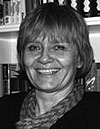
Chairwoman Mai Aggerbeck
The programme group’s primary task is to ensure the safeguarding of the Ministry of Education’s institutions’ participation and wishes in relation to DEFF. Focus in this context has been that the action lines and the continuous development of these should be supported by dialogue. The overall framework includes the library perspective in relation to a society where knowledge and the knowledge concept feature on the agenda – and the impact the perspective will have for library and education in the work with knowledge and knowledge processes. The formulation of the programme area’s action lines and the concrete projects stem from these reflections that also contain the question of what kind of challenges the library function will be facing in the future. Finally, the aim is to implement systems and solutions which have been developed by the other programme areas.
Activities
New Institutions has in 2008 pursued the following activities within the programme area’s action lines:
Communication
Development of a communication strategy for New Institutions on the basis of a needs analysis with interviews. The objective has been fulfilled. Activities:
- Workshop with participation of librarians, instructors, library-, knowledge centre- and education directors
- Focus group interview with selected DEFF representatives
- Articles in the periodicals DF Revy, Magisterbladet, Uddannelsesbibliotekaren as well as various newsletters.
Information supply and knowledge management
Digitisation of relevant teaching resources and integration in teaching and guidance.
The library function becomes visible in new structures and forms of relations to the users and help to ensure that knowledge-sharing takes place with a view to dissemination in the organisations. Activities:
- E-book and e-scanning project: preliminary study completed
- PURE: adaptation of PURE to university colleges in Denmark has been started
- Knowledge and Information Community: development of an interactive learning repository has been started
- Data well project: New Institutions is represented in the project.
Information literacy and e-learning
Support for the building-up of students’ information literacy at all levels of education and in practice as well as contributions in terms of ideas development in relation to information literacy. The library function is included as a valuable resource in connection with the development of new experimental forms of teaching and guidance. Activities:
Future perspectives
In 2009 the programme group expects to examine the effect of the group’s work at all levels, to follow up on projects already launched and to develop networks and relations, internally as well as externally with a view to continued perspectivation and further development of the work. In concrete terms an extended implementation of adapted technological systems and solutions is expected as well as an intensified effort in relation to the up-grading of the library function as regards knowledge processes in local contexts.
Finally it is expected that New Institutions’ extension with representatives from the upper secondary school area and a representative from the research libraries will contribute towards further ideas development of the programme group’s action lines.
Read more at https://inforshare.dtv.dk/twiki/bin/
License group for Education Librarians (LUB)
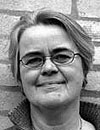
Chairwoman Karin Lodberg
2008 was a year of many new initiatives within the LUB area. New consultants have been employed in the DEFF secretariat and at the same time an exchange and reduction in the number of representatives has taken place due to a merging of BITS (libraries in technical colleges) and the Association of Business Colleges who now have only one representative and one substitute.
LUB has in 2008 been preparing for the extension by the end of the year with 135 upper secondary schools, eight VUCs (adult education) and 17 SOSU (basic social and health education programmes) schools. In this connection LUB has been in touch with the Ministry of Education and been visited by consultant Peter Rubeck with a view to a clarification of possibilities for funding and development in the many institutions, a large part of which do not employ any professional librarians.
The consortium day and LUB/LUF theme day (conference for Danish suppliers of e-books) planned for autumn 2008 has been postponed due to a congestion of events dealing with the same subject.
Discussion of possible license acquisitions, decision on the purchase of licenses that have been in a test phase as well as current adaptation of action plans have been regular items on group meeting agendas.
The transition to common electronic DEFF resources in the country’s largest university college has been a success, and the model has been used and will continue to be used subsequently. Furthermore, LUB has participated in Roskilde University Library’s charting of Danish licenses in research and education libraries.
A list of license requests, prepared in 2007, has been evaluated and deemed suitable for qualifying both LUB’s and LUF’s decision concerning license requests received, and the DEFF secretariat has worked out new procedures for responsibility, agreement on and payment of licenses.
In 2008 LUB has focused particularly on the marketing of licenses in relation to instructors and students, and work has begun on the accumulation of marketing initiatives tested in various educational institutions. These initiatives will now be processed with a view to being placed on www.deff.dk as ideas catalogue for common inspiration and usage.
VIA University College took steps to a meeting between DEFF and the university colleges to discuss the handling of statistics. In this connection LUB has voiced a request for the statistics to be prepared centrally in order to ensure unambiguity and professionalism as well as confidence in the results. This need is reinforced because of the many new institutions that are to be included in DEFF’s activities from the turn of the year – and which completely lack traditions for the collection of statistics data.
LUB has thus prepared for the coming year’s tasks and new challenges.
License group for Universities and Research Libraries (LUF)
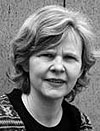
Chairwoman Anna Mette Morthorst
2008 has demanded many resources in the libraries and the secretariat in relation to the follow-up in the wake of the large fusions in the university field.
In 2008 DEFF implemented a new invoicing system with payments in April and October and two payment overviews for the libraries. This happened in continuation of the grants reform and the state’s change to a cost-based grants system. The procedure has been discussed currently in the license group and included suggestions for improvements.
Knowledge Exchange Tender has resulted in five products: ALPSP, Bioone, Multi-Science, the Scientific World and Wiley/Blackwell e-books. Options were sent out on 7. May to the four participating countries – including the Danish consortium. There have been a few confirmations for the first two, while Scientific World Journal has become a national license with access for all DEFF libraries. The national license became a reality with financial support from DEFF, as the steering committee has granted means for the payment of the license over a three-year period.
LUF has appointed various working groups which in 2008 have been dealing with the following areas:
Danish licenses: A questionnaire has charted which Danish e-products the research and education libraries have access to today. The libraries have supplied information about suppliers, possibilities for access management and remote access as well as a general assessment of the product. The questionnaire will i.a. be used to estimate which products should be prioritised in connection with negotiation of new DEFF licenses.
E-books: The group has charted the market for e-book packages and platforms. A list has been compiled of existing packages, and information is available on subject area, price model, supplier, access and licence conditions. A theme day on e-books has been discussed and will be held in early 2009.
Several LUF group members have participated in work relating to the license area, e.g. the DEFF data wells clarification project and a project group concerning WAYF and commercial services. Anna Mette Morthorst has been coordinator for the project with a repeat application to the national pool for research infrastructure as well as the work with preliminary investigations into a possible national solution regarding link resolvers.
Many of the initiatives mentioned will require following up in 2009. There will be a marked wish for consolidation and stable progress within the license area after the busy years of fusion for the libraries and well as the DEFF license secretariat.
Knowledge Exchange
Knowledge Exchange (KE) is the international knowledge exchange collaboration in which DEFF has been active since 2005. The KE-initiative partners are Joint Information Systems Committee (JISC) in Great Britain, Deutsche Forschungs-gemeinschaft (DFG) in Germany and the university organisation SURFfoundation in Holland. The four organisations are very different, both as regards organisational structure, assignment and mission. But common to them all is their role and visions in terms of the establishment and development of a coherent Information and Communications Technology (ICT) and information infrastructure for researchers and students. Since the start DEFF has provided the premises for the KE-secretariat.
New agreement
Following tenders KE has chosen consultants to evaluate the actual KE-initiative. The evaluation has formed the basis for the KE-partners’ assessment of and decision on a future collaboration, including form, organisational structure and extension of the membership circle. Structural changes have e.g. included the board being replaced by a steering committee with a representative from each of the partner organisations, the secretariat becoming further integrated in the local organisation, and KE appointing a part-time coordinator. An annual Strategy Forum with participation of i.a. top management from the partner organisations sets the strategic course. JISC, SURFfoundation, DFG and DEFF have accepted a new three-year period of collaboration lasting from September 2008 to 2011.
Strategy Forum
The second Strategy Forum was held on 10. January 2008 in Utrecht. The most important result of the meeting was the continued backing for a continuation of dialogue and cooperation, and consequently a new three-year period. Likewise the participants in Strategy Forum were agreed that the present prioritisation should be extended to include the development of a common access to both Virtual Research Environments and the preservation and access to primary research data. Very high prioriti-sation was also given to the establishing of a dialogue with the EU at strategic, political level to inform about the KE-partners’ views concerning the preferred infrastructural development, including European Digital Library.
The third Strategy Forum was held on 21. November 2008 in London, thereby making it the first in the new three-year period. It was agreed to continue with the same vision as in the previous period and continue to strengthen the dialogue with the EU.
Open Access
In September 2008 KE sent a letter to Janez Potocnik, EU commissioner for Science and Research, with recommendations for the further development of Open Access. KE urged the commission to continue its efforts to provide public access to the results of publicly financed research. Janez Potocnik’s response to the letter was to invite to continuous dialogue and collaboration.
The OA working group held two workshops during 2008. The first took place in September, entitled Expert Workshop on Journal Transition and the second From Principles to Practice in Good Copyright Management was held in December. Both workshops will in 2009 be followed by further workshops on the subject.
The four partner countries launched a cost-benefit analysis in 2008 of alternative publishing models, which is being conducted by John Houghton, Victoria University, Australia. The JISC report is expected to be completed by the end of the year, while the remaining reports will be completed in 2009.
National licenses in joint tender
The joint license tender, which was agreed upon in 2007, was completed in early 2008, and five suppliers were identified. The agreements cover access from 2009, and were sent to the institutions in the four countries for subsequent registration.
Unfortunately the backing has not quite come up to expectations.
Working groups
Three new working groups started in 2008, namely Virtual Research Environments, Primary Research Data and Libraries in the Digital Age (European Digital Libraries). Several workshops have been planned as well as the preparation of a report to clarify the legal aspects in connection with ownership to primary research data.
EU
One of KE’s prioritisations in 2008 has been to continue the dialogue and extend the collaboration with the EU Commission.
International cooperation
In 2008 DEFF has been involved in a number of international fora. Apart from that the license staff in the secretariat has been in regular contact with predominantly foreign suppliers who normally attend negotiation meetings in Denmark or negotiations in connection with larger conferences abroad. The DEFF secretariat annually negotiates a number of contracts based on a contract portfolio of more than 250 contracts. The contract volume reached over 128 mil. DKK in 2008.
- DEFF presented a paper at BIBSYS’ conference ’The Future of Academic Libraries – the Road Ahead’ in February 2008.
- In April 2008 DEFF participated in the annual conference in UKSG (United Kingdom Serials Group) in Torquay, where apart from inspiration from lectures and workshops, possibilities easily offer themselves for meetings with suppliers and networking.
- In April 2008 DEFF participated in JISC’s annual meeting in Birmingham. As ever the meeting provided a unique opportunity to follow and learn from the activities in the largest and broadest programme for digital instruction and research in Europe.
- At the Nordic level the cooperation on purchasing electronic information has been carried on i.a. at a joint meeting in Sweden in June 2008.
- License work at European level continues to take place i.a. through the organisation ICOLC (International Coalition of Library Consortia). The conferences alternate every six months between Europe and North America, and DEFF participated in October 2008 in the conference in Munich.
- DEFF participated in OCLC’s RLG Programme’s first European meeting in Paris in November 2008.
- DEFF participated in Elsevier’s 6. Nordic Librarian Forum in November 2008 in Helsinki.
- In early December DEFF participated in ’Online Information 2008’ in London Olympia. Apart from network collaboration the purpose of participating in this annual event is solely to stage a large number of meetings with suppliers.
- In December 2008 DEFF participated in the six-monthly meeting for Coalition for Networked Information (CNI) in Washington.
- DEFF supports Open Access publishing via membership of SPARC, just as through membership of COUNTER DEFF works for standardized and comparable registrations of the use of electronic resources. DEFF is moreover involved in the cooperation in Transfer.
Accounts
At the end of 2007 DEFF carried forward about DKK 0,2 mil. to 2008. DEFF’s ordinary funding under the Finance Act amounted to DKK 17,4 mil. In 2008 the funding under the Finance Act for DEFF was divided between funding for operational expenses (DKK 8,2 mil.) and a subsidy grant (DKK 9,2 mil. The operational grant under § 21.31.06 included three sub-accounts: salary (DKK 4,6 mil.), other operational costs (DKK 3,6 mil.), Knowledge Exchange Office (DKK 0,3 mil. net).
The license activity has a special account and is expenditure neutral.
The subsidy appropriation is placed under § 21.31.05. These means have all been spent on subsidies for projects. The subsidies have been apportioned by the steering committee on the basis of applications from primarily the programme groups.
The difference between the appropriations to the different programme areas thus reflects the steering committee’s prioritisations, but also the difference in the number of applications. The large amount for subsidies outside programme areas is primarily due to the steering committee deciding to support the State and University Library’s purchase of a new library system for the entire University of Aarhus.
| Financial statements 2008 |
DKkr. |
| FL-funding |
17.400.000 |
| Carried forward 2007 |
187.000 |
| Reverse transfer 2008 |
725.000 |
| Total funding |
18.312.000 |
| Costs programme areas | |
| Architecture & Middleware |
2.228.000 |
| Information Supply |
1.735.000 |
| Meeting the User |
539.000 |
| New Institutions (incl. licences for the UVM-area of 750,000) |
1.232.000 |
| PURE |
1.018.000 |
| Outside programme areas |
4.430.000 |
| Total costs programme areas |
11.182.000 |
| Operational costs | |
| Knowledge Exchange |
375.000 |
| Other expenses (conferences, travel, publications etc.) |
1.255.000 |
| Secretariat |
5.500.000 |
| Total operational costs |
7.130.000 |
| Total costs |
18.312.000 |
| To be carried forward to 2009 |
0,00 |
The general expenses for travel, conferences etc. are extracted from the programme areas. The item covers the costs for all participants in all programme areas, steering committee and secretariat.
Total costs amounted to DKK 18.312 mil. and DEFF carries forward DKK 0 to 2009.
Projects
The overview covers solely projects that are completed or launched in 2008 – or planned for 2009. A total overview of DEFF projects can be seen at www.deff.dk
Completed projects
Architecture & Middleware
- Usability and Integrated Search
- Primo licenses
- Feasibility study: DanBib as genuine union catalogue
- Danish libraries in WorldCat
- National front page service
Information Supply
- Data well for e-books – clarification project
- Data well for articles – clarification project
- PINDAR
Meeting the User
- Does it increase the students’ study competence if methods of study technique are integrated in the teaching?
- The library as active learning partner – information literacy and new roles for the research libraries
- Project local, regional and national virtual reference
- Establishment of Asia portal
- Shibboleth and Elsevier/Science Direct
- Development of DK-AAI Learning Object Web
- Web tutorial on plagiarization
- EduMedia Phase 2
New Institutions
- Clarification project for e-learning programme
Other projects
- Subsidy for purchase of back files at university fusions (Royal Library, State and University Library, Technical Knowledge Center of Denmark)
- Purchase of back files from ISI database ’Web of Science’
Projects started
Architecture & Middleware
- Connection of commercial library services to DK-AAI
Information Supply
- Danish Open Access Network
- 1. CRIS-OAR and 2. Electronic theses and dissertations (ETDs) compound objects and interope-rability
- Public access to Danish research (self-archiving)
- Determination of national data format for project registration and specification of further development of PURE/Orbit
Meeting the User
- Preliminary analysis: Explorative search
New Institutions
- Knowledge registration system to university colleges (PURE)
- Knowledge and Information Community (KIC)
- Evaluation of experiments with digitised Danish material (e-book)
- Development of e-learning module in knowledge search
- Mentor-supported information literacy
Other projects
- Establishment of common library system for University of Aarhus
Projects planned
Architecture & Middleware
- National EzProxy and National link resolver
Information supply
- Data well
- Statistical tools for journal accession
Meeting the User
- Expert workshop and user ’tour’ with external consultants
New Institutions
- New library system/standardised electronic platform for upper secondary schools
Other projects
- DEFF report on future library service to researchers
- Campaign for Open Access principles and License to Publish / 2. introduction to a series of workshops on ’Best Practice for E-journal Publishing’
Objectives 2009
Activities and fulfilment of objectives in DEFF are normally dependent upon the prioritisations of the participating libraries and those educational and research institutions that the libraries service. In last year’s report there were expectations that 2008 would be concentrated on the many projects to which the steering committee had granted subsidies at the last meeting in 2007. The action lines in these were numerous. The steering committee had i.a. highly prioritised the preparation of an Open Access Roadmap as an important element in international collaboration, the development of integrated search and data well, strengthening of the data collaboration in DanBib as well as not least the work with the bibliometric indicator.
In 2009 the common data well is placed very high on the agenda. The work in relation to this will probably be quite time-consuming and resource- demanding for both DEFF’s stakeholders and the secretariat. It is expected that during 2009 an agreement between six large research libraries and the DEFF secretariat will be reached concerning a model for participation and further development of the well.
Another central objective is to get Open Access (OA) even more firmly placed on the map. By way of the programme group Information Supply a Danish network for OA responsible/key persons in Danish research libraries and institutions was established. With the help of this network DEFF hopes to be able to promote the spreading of OA-knowledge and -sharing in Denmark. It is likewise the ambition that the network can underpin the rea-lisation of activities within the Knowledge Exchange area. This is quite in harmony with the specific focus and prioritisation of the OA-area in 2009, where also John Houghton’s cost-benefit analysis is expected to contribute to the debate. It has been a pleasure to observe the Research and Innovation Agency’s increased focus on OA.
Despite the fact that DEFF is ’merely’ an adviser in relation to the bibliometric research indicator, this work takes up a lot of resources. This will probably also be the case in 2009, where Technical Committee has predicted that further initiatives are needed. This includes various adjustments in the local systems, the building up of support databases as well as a strengthening of data validation in relation to automatic validation in The Danish Research Database. Also many research libraries are expected to have to dedicate a lot of effort to their reportings to the Research and Innovation Agency.
The secretariat is striving to get a clarification of the future financing of WAYF as project means run out by the end of 2009. The possibility exists that the Research Net will take over and partly finance WAYF. At the very beginning of 2009 more than 500,000 electronic identities were able to use WAYF-login, and the growth is expected to continue into the new year.
The DEFF secretariat is looking forward to the established collaboration with the firm of consultants The Lime Guild about an investigation into future library service to researchers. DEFF is expected to provide secretarial assistance in the process, while The Lime Guild with Hans Siggaard Jensen at the helmet is responsible for content deliveries during the run of the project. Siggaard presented a thought- provoking paper at this year’s annual DEFF review that dealt with new trends within research, education and knowledge systems. The report is also expected to contribute with ideas as to future research and research tendencies, including of course the research library’s role in that context.
In organisational terms the major challenge has been that DEFF by the turn of the year had to appoint a new steering committee for a new four-year period 2009-2012. Kim Østrup, retiring chairman, has found it imperative that a certain continuity in the group should persist. A major clarification effort took place in autumn 2008, but DEFF’s coordination committee did not manage to get the new steering committee appointed before the end of the year. The composition of the committee is however decided upon to the effect that it will consist of three representatives from the Ministry of Culture, the Ministry of Education and the Ministry for Science, Technology and Innovation respectively. To this a chairman has been appointed as the 10. person.
The general upper secondary schools, SOSO schools and the VUCs entered DEFF as per 1. Jan-uary 2009. It means that these institutions in the coming year will bring great influence to bear in the DEFF collaboration. Furthermore, they are to be integrated in DEFF’s programme groups and the DEFF collaboration as such. There are some quite definite challenges facing these institutions in relation to licenses, IT systems and possibly a new library system which DEFF is going to help find the right solution to.
Theme: DEFF review 2008 – the library as strategic partner
The research library can get an even more central role in relation to research and learning processes in the universities in the coming year. That was the main message from the review which DEFF carried out in September 2008. However, it was also stressed that this presupposes a targeted effort from the libraries and DEFF.
The review took the form of a seminar with presentations of papers and discussions over two days, which were subsequently summed up in a report with conclusions and recommendations. This report therefore represents an assessment of DEFF’s strategy, overall prioritisations and action lines in the light of international development within the field of libraries, education and research. The report was compiled by the DEFF secretariat in cooperation with the reviewers.
The reviewers are representatives from the English JISC and the Dutch SURF, both of which DEFF cooperates with through Knowledge Exchange. The report is moreover based on discussion papers about DEFF from DEFF’s programme groups and about the more general development from professor Hans Siggaard Jensen and deputy director Birte Christensen-Dalsgaard.
DEFF has previously conducted similar reviews in 2001 and 2005. This most recent review from 2008 was carried out towards the end of the previous steering committee’s term and can thus be included in the new steering committee’s strategic basis for decision-making.
In a strategic context the issues in the review can be divided into two areas: professional and organisational. The former includes a description of the development within research and education and the development within libraries and information technology as well as a number of professional recommendations. The organisational challenges stem partly from the professional problem issues, partly from a more concrete assessment of DEFF’s present organisation. In the following a number of the most important points within these areas are described.
Development within research and education
The previous review from 2005 described a number of development tendencies for research. They are still relevant, but in the latest review greater emphasis is placed on innovation as an increasingly important factor in the universities.
Innovation is defined as an idea that can create value in a social system – e.g in a market. Thus it is not sufficient for an innovation system to possess new knowledge, one also needs a good idea.
Traditionally speaking research and innovation were considered as separate domains, and it was expected that innovation would naturally evolve from research. However, increased focus has come to be placed on connecting research to innovation and on supporting the innovation process itself.
This endeavour can create new challenges for the libraries. Are the libraries – apart from their traditional task of supporting the researcher’s search for new knowledge – also to support the creation of value? This might for example happen with systems which to a greater degree can contribute to new ideas and inspiration. Either way the development within the library field and IT seems to provide the libraries with the opportunity to move closer to the research and education processes in the universities.
Development within library and information technology
The review points out that the library represents two core values: reliability and structure. The library’s role as information provider is becoming less central for both research and education, but based on the traditional core values the library can develop services to support processes within the field of research and learning.
The library can for example use some of the new technologies to structure scientific data and contribute to the interpretation of these. It may be technologies for visualisations or so-called mashups where data and functionality from different sources are integrated to a new application. In this connection the importance of open standards and dynamic systems, which facilitate integration with other systems, is stressed. With new technologies the library can contribute to structuring and mediating data in new ways.
Technological developments such as cloud computing, pervasive computing and mobile units likewise on offer new possibilities to the library. The library can be present on new platforms with services to the users, but at the same time the development challenges more traditional services. The weakening of the library’s role as information provider underlines the importance of the library moving closer to research and learning processes and contributing in new ways. These processes are still under development and research and learning processes generate for example an increasing number of data which the library can help handling. Apart from this a number of library fields such as for example explorative search and information literacy have many connections to more formal learning processes. The general picture of the technological development within the library field is thus a movement from collection to services based on the library’s traditional core values.
Professional recommendations
On the basis of experiences from Holland and England the reviewers reached similar conclusions. They stressed the fact that the library must be able to handle ’enhanced publications’ and ’packages technologies to structure scientific data and contri - and knowledge’ (models, visualisation and other non-text-based content) that appear as the result of research and learning processes. They also emphasized the need for the library to move close to the users, thereby gaining a closer integration with research and education. They furthermore felt that these endeavours could profitably happen on the basis of cooperation on virtual learning environments and virtual research environments.
The reviewers recommended an increased focus furthering Open Access also in relation to learning objects, and that the libraries should work with a more formalised and structured approach to information literacy. Finally, they highlighted a number of problems that cannot be solved by the libraries on their own. Thus they warned against major projects within central areas unless it is part of a prioritisation the universities. Open Access and publishing policies, information literacy and the libraries’ role in relation to virtual learning and research platforms were put forward as examples.
Organisational challenges
There was general praise to DEFF for the results and backing for the strategic direction. However, the reviewers did point out a number of areas where the organisation of the collaboration could perhaps be optimized.
It was emphasized that the steering committee’s role could be more explicitly determined. A distinction was made between a steering committee that actively determines direction and prioritisations, and an executive committee which to a greater degree challenges and controls the management’s plans and financial decisions. The reviewers felt that the steering committee ought to consider which role it wishes to fulfil.
As far as the programme groups were concerned their efforts were praised, but the reviewers thought that the groups might improve their communication skills in relation to which problems one wishes to solve and the connection with the overall strategic prioritisations. It would make it easier for outsiders to understand the solutions proposed. More explicit success criteria and measurable targets were also called for.
The organisation of DEFF’s programme groups has been based on a three-tier IT architecture. The reviewers did not find the organisation intuitively comprehensible and lucid, and they suggested an organisation based on a three-tier in: ’information supply’, information management’ and ’information literacy’.
They furthermore felt that DEFF ought to work out a strategy for what DEFF wants with the educational institutions and which role these institutions can play in DEFF’s overall strategy. Finally an increased focus on an ’advocacy role’ was proposed, where DEFF tries to promote certain points of view. This suggestion should been seen in the light of the opinion that many problem issues cannot be successfully dealt with without the universities’ backing.
The review thus underlined the fact that DEFF and the libraries have to engage the universities in strategic initiatives. It is for example not expedient to conduct library projects within e-learning and information literacy if these have not got a strategic priority with the mother institution. It is a challenge for DEFF to obtain this type of strategic coordination and to put the mother institutions under the obligation of attending to strategic library development.
Great challenges are likewise facing the individual library. The library must apparently offer ever more complicated solutions and IT services in order to appear attractive to research and learning environments. This may be difficult for the individual library to handle without close collaboration with other libraries. At the same time the library has to support a process focus and move even closer to local learning and research environments which may make coordination and keeping pace with other libraries difficult.
This page forms part of the publication 'Annual report from Denmark’s Electronic Research Library 2008' as Entire publication with graphics
Publication may be found at the address http://www.bibliotekogmedier.dk/fileadmin/publikationer/publikationer_engelske/deff/annualreport_2008/index.htm
© 2009